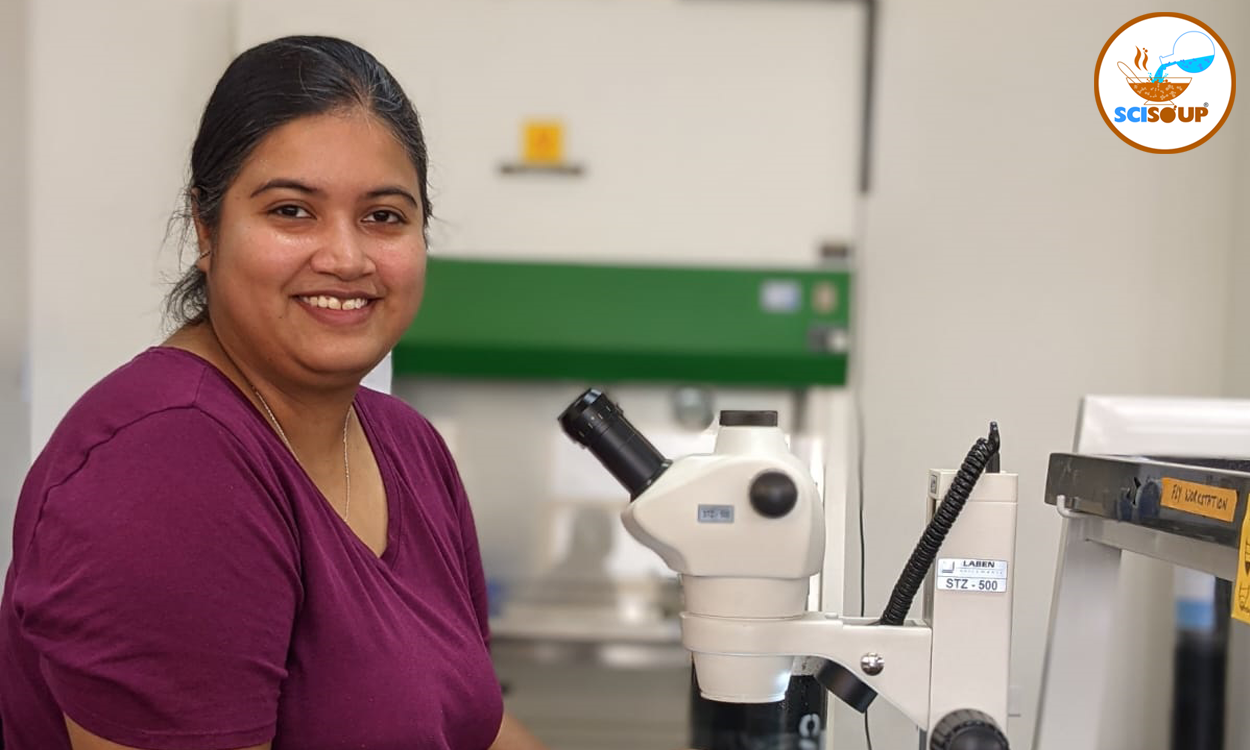
Embarking on an independent scientific journey as an academician heading an independent research group with teaching responsibilities comes with a set of unique challenges. Each person has a unique way of navigating this path. The background preparation and strategies one employs to get into an academia based position are also varied. As a part of SciSoup Blog Series, we have tried to collate a questionnaire that various young investigators and early career researchers have responded to and we hope that this brings in new perspectives, ideas and helps aspiring young researchers who are planning to take this path and embark on this exciting journey ahead.
June 17, 2022 | BY ROHAN J. KHADILKAR
In this mentoring Blog post, we would be sharing with you the views and experiences of Dr. Antara Das from Azim Premji University. Antara Das is a neurobiologist interested in studying how genetic mutations in ion channels leads to electrical imbalance in the brain, resulting in brain disorders such as epilepsy. She graduated with a PhD degree from JNCASR, Bangalore and has worked as a postdoc research scholar at University of California, Irvine (UCI), USA.
1) How was the transition like from being a postdoctoral fellow to an independent investigator and leading a research group?
I was quite determined to return to India after my postdoc at University in California, Irvine. My transition back to Indian academia was patchy but an extremely rewarding experience. Since I moved back in the middle of the delta-COVID wave, uprooting my family from Irvine and re-settling in Bangalore was a daunting task, but thankfully I found help along the way.
Like many ECRs who were on the job market in 2020-2021, it was a very stressful period for me, with many institutes freezing their recruitment drives, things were looking bleak for me. A few of my manuscripts were still under preparation and I was worried that I would not come across as a competent candidate in terms of publishing records. As I always been interested in undergraduate and graduate teaching courses, I applied to places which had a teaching focused positions. I was fortunate that I joined the Biology group at Azim Premji University, where I have extremely supportive colleagues and a great collaborative environment. I had extensive discussions with my faculty colleagues about how I could balance my new responsibilities as a researcher and an educator, without feeling overwhelmed. I am 10 months into my new position and just concluded my first ever teaching semester. It was challenging to prepare to teach to a diverse student population across BSc. Biology and B.Ed groups, but I am grateful for the interactions I had in the class. It has been a steep learning curve.
After I accepted the job offer, I negotiated with my current university to buy a few lab equipment from USA (before I left Irvine) as they were not available in India. That helped me to kickstart the Drosophila lab at Azim Premji University. I have two BSc honors-track students who are working with me to answer questions pertaining to genetic epilepsy disorders and sleep behaviour using Drosophila melanogaster as model systems. We are off to a good start, wish us luck!
2) What advice and tips you would provide to a person who is planning on transitioning to academia and is on the academic job market?
1) Join Twitter - there are a lot of discussion about ECRs, announcements on ECR workshops, seminars, etc.
2) Join STEMpeers group on Facebook – it is a good resource for networking with academics all over the world, especially with the Indian diaspora. Literally every topic from job opportunities, transition into non-academic jobs, to visa problems are posted and people come forth to help you.
3) Follow IndiaBioSciences – Their webpage is a good resource for connecting with other YIs, learning about workshops, their science communication initiatives, and a lot more. Follow their newsletters for job and grant application deadlines. Participate in the Young Investigator Meets that happen annually. Again following IndiaBioSciences on Twitter is a great idea as they publish a thread on current opportunities every week.
4) NETWORK! Talk to colleagues in India, request them to invite you for seminar talks when you visit. Peers who are a few years senior to you would know about the funding opportunities that you might be eligible for. Ask them about their experiences in grant-writing, purchasing lab equipment and navigating the job market. Everyone will have their unique journey to tell.
5) If your university/ institute has workshops on learning to negotiate about your salary & benefits, attend them. Apply for fellowships.
3) What are some of the specific challenges you faced while setting up your own lab and starting a new research group?
Since I am in a liberal arts university which is in its nascent growth phase, our student population mostly comprises undergraduates. Hiring RAs/ project assistants with research experience or a Master's degree requires individual funding and coordination with the hiring process. I have to wait for a couple of months till I have my own funding. Also importing lab equipment, getting quotes and making a decision on which model or make would be best, has been a challenge. After my PhD thesis work on Drosophila, I transitioned to study mouse models of epilepsy during my postdoc. Now moving back to my favourite fruit-flies, sometimes is a challenge (for me) as I feel I have missed out on the latest developments in the field, pertaining to new equipment, techniques etc. Chalking out a budget to account for consumables vs equipment vs hiring personnel is definitely a challenge.
4) Which are some of the fellowships/grants that an early career researcher in India can apply for in order to kick start their career?
DBT/Wellcome Trust India Alliance fellowships, DBT Ramalingaswamy, DST Ramanujan fellowships are the well-known opportunities – however it is important to keep track of new rules and regulations, and deadlines. There are SERB, DBT/DST sponsored senior postdoc fellowships as well and you can start your own project under a PI and then move onto to independent positions. Here, it would be important to set expectations and ownership of the project, publication ethics, etc. at the outset.
5) Your thoughts on teaching, mentorship and its role in shaping curious minds?
I am a firm believer in active learning. The teaching philosophy across institutions is changing and has become student centric. This approach helps the students learn better than traditional classroom lecturing. The teaching workshops at UC Irvine helped a lot to understand pedagogy-based approaches to design courses, implement active learning tools in class, asynchronous learning and the importance of continuous assessments. Discussion on pedagogy have continued at my current university and I continue to learn from my colleagues and students. Gathering periodic feedback on courses has been another helpful way to tweak the learning structure. Students are quite vocal about the parts they did not enjoy in the course or portions they found difficult to navigate. If you take their feedback with a pinch of salt, it can be a great resource to modify your teaching approach.
A good mentor can be a powerful enabler for young students, and especially for students who are first-generation scholars. Every mentee is unique and so are their struggles and hurdles. Being empathetic and supportive requires you to tailor your mentorship strategies according to their needs. At the same time, you cannot be a one stop problem solver or substitute as their parent/ guardian – striking this balance can be challenging! It is important to assess the interests of your mentees and set mutually acquiesced goals. It is good to be aware that we all have implicit bias, and there is a power dynamics at play, hence it is important to censor the words we use while we talk to our mentees. Being a good mentor is also a constant learning process, and discussing with your peers, imbibing good mentorship qualities, and being honest with your mentees- can all help in this journey.
6) If you were to share your life philosophy or “mantra” that you believe in the most that also helps you in 'sciencing', what would it be?
Do things at your own pace; do not compare yourself with someone else's career trajectory to assess your "success". We all have our own individual struggles and journeys- that is unique and beautiful. (If you are a first gen scholar or identify as an under-represented minority group in STEM, navigating an academic career can be difficult). Be kind on yourself. For fellow women scientists, I would say balancing a family and kids with an academic career presents unique challenges along with mom guilt. Finding/asking for support at home and workplace would be beneficial for your mental & physical health. Don’t hesitate to talk to a therapist if you are feeling overwhelmed or if you feel like “no one understands you” and “this is not fair.” What has helped me is to slow down when I felt burnout, I took care of my health, found time to go for walks/ online Zumba/ gardening – anything that brought me happiness. I have carved out a few hours in a day for “me time”. Being organized is important – but you should prioritize what is important to you. For me, setting every day and weekly goals on a notepad or e-sticky notes aid me in keeping myself on track.
Dr. Antara Das was interviewed by Dr. Rohan J. Khadilkar (INSA & Har Gobind Khorana - IYBA Awardee, Ramalingaswami Re-entry fellow), Tata Memorial Centre - ACTREC, Navi Mumbai, India.
Edited by - Ratneshwar Thakur and Dr. Rohan J. Khadilkar

Send your opinions, questions, and suggestions for future column topics and stories - to scisoup@gmail.com and engage with us on